You’re listening to Burnt Toast!
I’m Virginia Sole-Smith. Today I’m chatting with .
Jenn is a longtime journalist and magazine editor. She co-hosts the podcast Everything Is Fine with
and writes the Substack . And Jenn’s new memoir Ambition Monster is just out this week!Ambition Monster is a deeply personal memoir about workaholism, the addictive nature of ambition, and the humbling process of picking yourself up when the world lets you down. It’s an anti-girlboss tale for our times. And Jenn writes quite a lot in the book about her years in women’s magazines. So I asked her to come on so we could process some of our trauma together. We get into the very specific intersection of diet culture, perfectionism, and workaholism that we survived working in women’s media in the early 2000s and 2010s—which may feel like ancient history but a lot of that stuff is still with us.
Ambition Monster is available in the Burnt Toast Bookshop!
Don’t forget, you can always take 10 percent off that purchase if you also order (or have already ordered!) Fat Talk from Split Rock Books! (Just use the code FATTALK at checkout.)
PS. If you’re enjoying the podcast, make sure you’re following us (it’s free!) in your podcast player! We’re on Apple Podcasts, Spotify, Stitcher, and Pocket Casts! And while you’re there, please leave us a rating or review. (We like 5 stars!)
Jenn
I’m Jenn Romolini. I’m a longtime writer and editor. I was at one point a Chief Content Officer. I’m former tech executive. And I had a professional crash in 2018, reassessed my entire life, got myself off the ladder I’d been on, and wrote a book about it called Ambition Monster. And now I am a podcaster and a writer. And that’s me.
Virginia
You co-host the Everything Is Fine podcast which is my every Monday morning “walk the dog and listen to Jenn and Kim” hour and I love it so much.
Jenn
I love it too. It’s a very fulfilling project. I think it’s fulfilling because that’s all we want. We just want it to be fulfilling, you know? That’s part of reassessing your feelings about work, what actually lights you up. That’s one of the things that lights me up.
Virginia
That’s something I’ve thought about a lot as I’ve listened to it over the years, both you and Kim both had these huge careers, you had visibility in lots of different ways. And every week it is the just two of you having so much fun together—like the way you crack each other up. You’re being so generous by inviting all of us into your friendship in this really beautiful way. This is what we want to be creating now. Fuck the ladder.
Jenn
Exactly. And fuck looking for external validation, too. We don’t even really imagine that people are listening to the podcast, we’re doing it for us and then we’re happy that other people have come along. That’s a huge shift. And I think that’s a shift that only could have happened with age and experience.
Virginia
So tell us a little bit about Ambition Monster. I inhaled this book. I ignored my children. I was cooking dinner and letting things burn to keep reading—it’s that kind of reading experience.
Jenn
I’m happy to hear that you devoured it. I didn’t mean for you to burn dinner, but I’m happy to hear that it hit you like that. I want this to go off like a bullet. I want it to be fast because I wanted it to feel like an addiction memoir, and I wanted it to have the stakes of an addiction memoir and be building in that way, because that’s the way work felt for me. It was very toxic. I had a relationship with work that was really problematic, that sort of blotted out everything else in my life. And it was starting to ruin my life. It was ruining my relationships, it was ruining my health. It felt like an addiction like any other. So, I intentionally wrote it in that kind of pace that to feel like you feel when you’re in the throes of an addiction.
Virginia
It feels that way. You also take us into your whole family history. We’re right there in Philly, in your childhood.
Jenn
I didn’t want to have to expose so much of my personal life, but as I started writing about workaholism and ambition, it became very clear to me that I had to tell an origin story. I had to name the source of never feeling like enough and never feeling good enough, and the connection between childhood trauma and perfectionism. And just all of the lies we were sold about having it all. The big, fake, fairy tales about men and that you could build this life and then it would somehow be in balance. It was it was an impossible lie. And it was very much sold to us by our mothers who were part of the Women’s Liberation Movement. They were like, “Okay, this is it. Now we just step into it.” And we were really ill prepared for how many ways it could go wrong.
Virginia
Well and for how much “having it all” means still doing work on the terms of the patriarchy, and on the terms of these systems of oppression. It wasn’t about reinventing work. It was about women playing the same game. Don’t worry, we can do it all.
Jenn
We can do it, too. And then also do all the other stuff, we can do it, too. We can do it just like them and do everything else, too. It was an impossible dream. And it didn’t hit me until I reached the height, the peak, because you keep raising the bar. You’re like when I just get there, if I just make a little more money, if I just get this title, if I just, if just, if I get married. If I have a kid, this certainly is going to be it. And when I had reached the point that it looked to the outside world like I had it all—like literally Cosmo was writing an article about how to get my life. I was like, this feels awful inside.
Virginia
Don’t get this life.
Jenn
You don’t want this at all! Get away from it!
Virginia
Well, and I think you tell the personal story with so much love. I really felt the love for your parents and for your extended family. I can imagine how complicated it is to write that stuff, but it felt honest and vulnerable and full of love in a way that I really admired.
Jenn
I’m glad I worked really hard on writing about my parents because I love them so much. And I understand what happened. I understand what my mother did. You know, they were teenagers when they had me. They were having to survive. I understand what happened. And in some ways, they’re heroes. I wanted them to come across as heroes. I wanted to talk about generational trauma and I wanted to talk about parenting and how parenting is just so hard for anyone but especially for people who had no models and no tools.
Virginia
And who are so young. Your mom was so young. Just thrown into it.
Jenn
Exactly, just thrown into it. I mess up all the time and I didn’t have a kid until I was 37 and had lived a whole life. I really wanted to be compassionate and empathetic while also not hiding the story because I had hidden it for so long trying to protect them. I’d really taken it on and kept it a secret. It felt very, very liberating to air it out.
Virginia
Since you mentioned the Cosmo story, the other piece that you spent a long time on in the book is your experiences in women’s magazines and New York City media more broadly in the early 2000s. And you and I are both survivors of that world.
Jenn
What a mess.
Virginia
It’s like that meme: The kids today would not last an hour in the asylum where they raised us. Jenn, they just wouldn’t.
Jenn
No way. I still don’t know if I’m over what happened in that situation. The other thing that the book is about is class, right? It’s a lot about class and Conde Nast was a shock and I spent a lot of time in Conde Nast both as a fact checker and as an editor at Lucky and I was at Allure for a minute and I was at Glamour for a year.
Virginia
Oh, I’m sure.
Jenn
It was just okay for somebody come up and call you portly. It was just okay. I was called portly. I was a size 8 or 10, it doesn’t matter. But it was just like—I was called portly.
Virginia
Yeah, that word specifically, too.
Jenn
Portly. And not to mention the stories I wrote and how the subjects had to be conventionally attractive or they would kill the story.
I remember fact-checking two stories, one about breast cancer survivors, and one about 9/11 widows. I remember the editors saying, “can we get more attractive people?” About the 9/11 widows. And then on the breast cancer survival story: “She’s chubs, we’re going to have to cut this one.”
Virginia
I have a feeling the listeners are imploding right now. So, just to give some historical context to that, women’s magazines in this time period were very big on these Real Women Stories. They would always be about the serious issues: Breast cancer, date rape, all these pressing issues that were that are actually incredibly important to women’s lives. And they would want to tell them through real women, often as “as told to,” first person essays. And so the editor or the writer assigned the story would literally have to cast these pieces with the right mix of real women for the top editors to be okay with. None of the women were ever real because they were so carefully slotted in.
I can remember age was another big one. If you wrote for a magazine whose demographic topped out at 26, God forbid you show them a 28 year old.
Jenn
Oh my God.
Virginia
They wouldn’t know what to do with it.
Jenn
I mean 40 was just like, can you imagine?
Virginia
Anyone over 40, forget it.
Jenn
It was a nightmare. Unless it was a model and you were making this big deal about it. I just think about how complicit we were in our own subjugation. Because this was a time where the tabloids were circling cellulite. Remember? Like, it was just like such a “gotcha!” moment.
Virginia
Yes, Jessica Simpson was “fat.”
Jenn
Oh, remember that? Oh my God, yeah. It felt sickening to be in it. I was married to a writer, he worked at men’s magazines. It was totally different game. Didn’t matter what he wore to work.
Virginia
No mandatory pedicures.
Jenn
No. Exactly. The money we spent just to work there, just to keep yourself groomed. I could have retired on that!
There were so few jobs for women in publishing at the time that were outside of women’s magazines. And, the women’s magazines paid the best. Because I actually had a job I loved at Time Out New York, but I made $35,000 a year as an editor of a full section. So it was like, at a certain point, the lure of survival brought you there.
Virginia
It brought you there and then you were trapped there. You couldn’t get your pitches read by editors at a men’s magazine, or even a general interest magazine, because you came from lady mags.
Jenn
Exactly. They wouldn’t even look at your pitches.
Virginia
It was a fancy prison.
Jenn
It was a fancy prison. That’s exactly right. It was a fancy prison run by skinny, wealthy, white women. Like, Mayflower white. Because it was also a very particular kind of white lady who was acceptable in those worlds. That was the class culture shock for me, too. I come from working class, like I’m fully self-made. I had no money. I really had no money. I was in such terrifying debt. I remember talking to somebody on the fashion team—I’d written something about a $150 dress—and she was like, “that’s a budget dress.” She was like, “you can’t get a decent dress for less than $500.”
Virginia
And this was in early 2000s money, people!
Jenn
Yes, exactly. It’s so shocking. Lucky for me I found a workaround. I was one of the first people on eBay when eBay came out. In the early days of eBay, you could really find steals.
So I would look through what was coming up, like spring fashion or whatever the next season was, and I would find dupes on eBay. I had an incredible vintage wardrobe. I was very proud of it. But everything was like $30 that I bought. So I just was able to pass. Because I was just hoping to pass in that world. I remember going to a meeting and I had a weird hairstyle that day—I put my hair and braids on top of my head, you know? And somebody said, “It’s hard to make a pretty girl ugly, Jenn, but somehow today you’ve managed.”
Virginia
Wow.
Jenn
In a meeting! Out loud! In front of other people!
Virginia
At work. Where we’ve all come to do our jobs.
Jenn
Yes, I mean, The Devil Wears Prada is a true accounting of what this shit was like.
Virginia
It’s pretty much a memoir.
I remember, either as an unpaid intern or a very poorly paid editorial assistant at Seventeen, getting roped into being one of those real women on a photo shoot. And none of the things zipping up the back and everyone just kind of standing around being like, “well, I guess we can make it work…” And just picking your body apart. That’s super scarring.
Another time, we did this photoshoot at Seventeen where we had all these real girls doing workout gear. And they’d brought in one size 12 girl to check that box of “we have one real body!” I still think about the girl because they were legit teenagers. And she was gorgeous. So I hope she went on to feel really great about herself, but it was a not positive experience that day.
Jenn
Well, this was also part of the thin privilege because the sample sizes were 0, 2 and maybe 4. The people who were those sizes got free clothes all the time because they could fit into those clothes. So they got anything that came in sample that we weren’t sending back. I would never fit into those clothes.
Virginia
No, definitely not.
Jenn
So they would get very expensive clothes for free. And you were just like, oh no, I have to buy everything myself.
Virginia
Because the expectation was still there that you’re going to dress at that level despite having no access.
Jenn
Exactly, exactly. We haven’t even gotten into the photoshopping and airbrushing. I remember there was a picture of Christina Applegate at one of the magazines I was at. I saw the proof on the art director’s desk and everything had been circled, like lift breast, do this, thin arm, and then on the bottom, the art director had written “make beautiful.”
Virginia
I mean and what’s outrageous about that is—I mean, it’s outrageous for her experience, of course. But if that is the standard? How outrageous to everybody who is bigger than Christina Applegate. Everybody is made to feel less than, because if that isn’t good enough, what is? That’s how these standards become so insidious.
Jenn
Right. And like, this is the only way clothes are supposed to look. This is the only way that’s acceptable to be, because this is the only thing we’re showing you. I mean, let’s not even get into the fact that everything was so white. There was one month a year, January, when you could put a woman of color on the on the cover of a magazine, which is also fucking crazy if you really think about that.
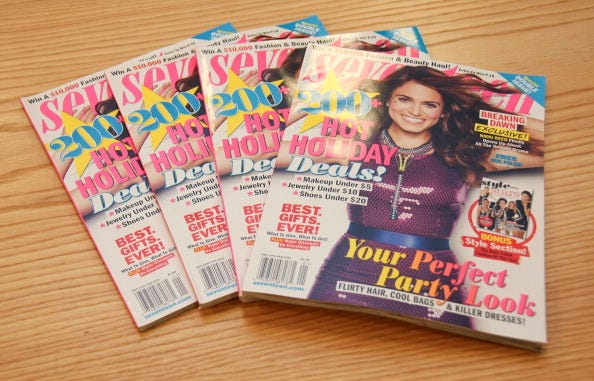
Virginia
And they would always talk about how it didn’t sell well. Hmm.
Jenn
Yeah, exactly. Put them on the cover the month of the year you know sells the least and then talk about how it didn’t sell well.
Virginia
Maybe give them September? Just a thought.
Jenn
I interviewed cover models, like the celebrities, the actresses, at the cover shoots. That’s where I would do the cover shoot interviews. It was so weird to watch them being put in clothes and how uncomfortable they felt. It wasn’t like playing dress up. It didn’t feel good to them either. We were all part of this machine that was just perpetuating all this toxic information, you know? I’ve worked for famous people and people who say to me, well, you can wear two pair of Spanx. And it’s like, who the fuck wants to wear two pair of Spanx?
Virginia
Yeah, no thank you.
Jenn
I don’t ever want to wear Spanx. But, like, the Spanx were a godsend, right?
Virginia
They were our salvation.
Jenn
Thank God for shape wear. I mean, I hate bras. I hated it all. It’s weird to think about it. It’s weird to think about why we didn’t just walk away.
Virginia
I mean, I don’t think we could see it at the time! Going back to the breast cancer story example—I think I felt really proud to be working on some of those pieces. I was like, “Well, this is the game I have to play to get the story told.” I finally convinced them to care about this issue, so I can find five women who are all between the ages of 24 and 35. And there will be one black woman, but no more. And everyone will be thin and beautiful. Somehow I’ll make that happen so I can tell the story. Which is of course not really telling the story because you’ve manipulated it so much. But it was that or not having the piece in the magazine at all.
Jenn
Right? And also those stories wound up shrinking and shrinking. I don’t know if you remember, they wound up being like one column. You’d start out with like a 3,000 word piece and it would just get whittled and whittled. It was like a caption by the end.
Virginia
One of the editors I worked for at Seventeen went into the art department during her first week on the job and said, “I hate words and girls don’t read. So make the pictures as big as you want.” And basically everyone in the features department was like, “So we start looking for jobs?”
Jenn
I think I know who that editor is and yes, that was the pervading philosophy. Girls don’t read. I remember being like, why can’t there be a women’s GQ? Why can’t there be a women’s Esquire? Why are we stuck in this?
Virginia
I felt so frustrated because I knew I didn’t even want to write for Esquire and GQ, because they were not going to do the stories that I wanted to write. I was never going to get an editor at Esquire interested in feminism. Like, it’s a non-starter. I was just always like, I don’t know where else to go. Because the places that do the “good journalism” don’t want these stories. And then the places that will do these stories will only do them if I squish them into this box. Why is this entire genre of media so pandering? Why is it assuming women are so stupid?
Jenn
It was funny because I did that podcast last year Stiffed which was about Viva Magazine, which was a feminist porn magazine from the 70s. The reason I wanted to do it was because I really wanted to talk to all these old time female writers and editors. I wanted to know what their experience had been like. An they were saying the same thing. They wanted all the same things. That’s why they like held their nose and went and worked thre. They were all smart, Harvard-educated people. And they went to go work for Bob Guccione because they were like, “Well, maybe we’ll get to make like not a totally vapid publication.” And they did. They did for years, next to all these naked dicks that they didn’t care about at all. They didn’t have any interest in the porn. He was pushing the porn, but they were doing all these really interesting feminist stories about sex and marriage and work and all of these things that they couldn’t get placed in other publications. There were people like us who wanted something better and bigger for women. And nobody would let us do it because they just wanted us to write about eyeshadow and pedicures.
Virginia
I want to be clear: There were so many brilliant editors I learned from at women’s magazines. I remember the head of fact checking at Seventeen had been there for like 30 years. She was just a brilliant, quirky, long-time journalist. There were so many people you could learn from. It was the corporation forcing us into those parameters. The individual features editors, or the researchers, we were all like “How do we do this?”
Jenn
No, not all of the editors. There was some true monsters.
Virginia
Yeah, I mean, the editor-in-chief is a different conversation.
Jenn
Conde Nast used to make their editors-in-chief go through a full head to toe makeover—including they had to go to a diet doctor to slim them down, before they got on the job.
Virginia
Jesus Christ.
Jenn
Just think about that, you’re like a walking marquee for this whole idea of femininity.
Virginia
So curious if they did that to the male editor-in-chiefs, too. Did David Remnick have to do that?
Jenn
Come on. You know the answer to that.
Virginia
How do you feel the rigid body expectations—and this idea that your whole body has to be your work—how do you feel like that fit into your workaholism? Because I do think they’re very related.
Jenn
I mean, I think Conde ruined me. I was kind of messy when I went into Conde, you know. I didn’t know from a blowout. But that perfectionism pervaded all parts of my life.
I started setting unrealistic expectations for myself in all ways after that experience, but particularly in the way that I looked. It was funny because then when I started working in tech, I showed up immaculate everywhere. I wouldn’t have said at the time, but I really worked to keep my weight at a certain level. And when I would show up for these tech interviews, I was way too done. I had become so polished and way too done. I was cosplaying as this sleek professional and it wasn’t who I was, in any way. But the Conde makeover was particularly brutal. I don’t think you can really escape it working there. Especially not in the position I had. I was the deputy editor. I don’t feel like I could have escaped it.
Virginia
I don’t think you would have gotten the job, or kept it. without playing that game. There was a degree to which it felt like armor, if we dressed this way.
Jenn
It was like a secret handshake or something, right? People being able to identify the the labels you were wearing and the bag you were carrying and that your manicure was immaculate. That really messes with you.
Virginia
I was insulated in a way because I went freelance pretty early. I was a freelance writer from 2005 on. But anytime I’d have an editor lunch at Conde or at the Hearst cafeteria, I would take the entire day off work to prep. To go into that lunch, to just to be in the lobby of those buildings, it felt like you have to arrive in a certain way. I didn’t understand how my friends who were editors managed to eat in those cafeterias every day.
Jenn
Oh, the cafeteria! I mean, talk about disordered eating. I have like a whole run in the book about how skinny women ate in the Conde Nast cafeteria, which was wild to me.
I think that sort of Conde Nast ethos fit into what I got into later, which was like a whole Girlboss thing, which was lwhen all of those books about making it all had stilettos on the covers. It was like, you have to be pretty to make it.
I tried to disrupt that narrative with my first book, but nobody wanted to hear about it. Nobody wanted to be messy. Everybody wanted to pretend like it was all going great. If you look at any of those books from that time, the women who are on the covers all look exactly the same. And if you dig a little further, they all come from wealth, or all had wealthy husbands. Their stories of making it were all about like, “Well, actually, I just started out great and then I had a leg up. And then I built this quote business.”
Virginia
“And I can afford a nanny and a housekeeper.” And even then, it’s still not quite working, but they can give the veneer of it.
Jenn
Yes, exactly. All that grooming, and all that presentation, of what a successful woman looks like.
Virginia
It’s something I have also really had to untangle. It’s hard because we survived our women’s magazine years and now we’re in the era of social media where there’s still an expectation that your face is going to be out there all the time and that you’re going to be able to be on camera very easily. It’s not the editor-in-chief who has to be ready to go on the Today Show at a moment’s notice, but we’re still performing our bodies, and performing how we look, in the service of work.
Jenn
Yes. I thought about that a lot, because I really wanted to hide for a long time after feeling so exposed for so long and performing for so long and performing an identity that wasn’t really me. Becoming inauthentic in a lot of ways and caring about things I didn’t really care about, et cetera, et cetera. So I went into podcasts and then suddenly podcasts were like video. I was like, wait, wait, wait. Even promoting this book, a lot of things have come up for me about, like, do I look okay? Are my outfits okay? Because it can’t just be about the work for women, ever. I understand the game because I was right in the fucking disgusting dirty middle of it. I was in the gross molten core of it. And I think about it a lot. I wrestle with it, you know? Ultimately, you just have to learn to disentangle the two. I think it’s one of the hardest things women will ever do.
Virginia
It’s so complicated because if you step back from some of it, there is a cost, right? There’s a cost. For every beauty standard you divest from or every bit of beauty work that used to feel essential that you’re like, “I’m gonna say fuck it to that,” that has real consequences for women. And the more marginalized you are, the more consequences you’ll have.
I do think there’s some power in just recognizing this is a game I play. I just wrote an essay about body hair because I still fucking get bikini waxes even though, as a feminist, I think it’s bullshit. But I don’t have the energy to opt out. And, I mean, we didn’t wear bikinis to women’s magazines and yet, there was still an expectation that you did that.
Jenn
Oh my God, like I said, the amount of grooming! The waxing and the plucking and the nails and the hair. And the hair, the hair cost so much money!
Virginia
The blow out bars.
Jenn
The highlights. And they they knew they had us. No men were paying $500 to get their hair highlighted. Come on.
Virginia
I know and those New York City salons that could charge those prices and not because they were paying their workers particularly well. But there would be the one dude celebrity hairstyles that everyone wanted to see. I remember one time getting one of those $500 haircuts and being like, What even was that?
Jenn
Because they’re not nice to you! And it’s what you’re supposed to aspire to.
All of that was really what I was wrestling with with this book because the only way to liberation is to stop caring about what other people think. It’s the only way. To be motivated internally by what do I want? How do I feel? And then that’s even confusing.
I let my armpits grow for a long time—speaking of hair, because I was like,”I don’t want to teach my kid that they have to shave their armpits.” Eventually I was like, “this is kind of uncomfortable.” Eventually, I came to like, oh, my armpits stink more. But I went through the whole journey with my armpits so I could really figure out how I felt about them. How much of this is internalized misogyny and how much is my own free will is the thing I think about a lot.
Virginia
It’s really hard to know because it’s always in there. The misogyny, the anti-fatness, we can’t escape it. I feel like all you can do is try to name where it’s showing up and then decide is there something that I get out of this as well? Or is this beauty work that only costs me. And it’s going to be different for everyone.
Jenn
And as a parent, no matter how well you do it in your house, the outside world is still awful and cruel. I mean, we’ve talked about this a lot—my kid lives in a bigger body. My kid is bigger and they experience so much bullying. It’s so painful because I worked so hard to not give my kid what I had. And they’re still suffering.
Virginia
Yeah, the world is still shit.
Jenn
There’s just no good answers for any of this except that we just keep trying to evolve and understand ourselves better and not participate in anything like we participated in in the 2000s.
Virginia
I think we’re doing better now. We can confidently say we can feel much better about the work we do today.
Jenn
And you know what? I don’t think that Jessica Simpson would be called fat today.
Virginia
No, I don’t think so.
Jenn
I mean, now she’s on Ozempic. So who knows. Fucking Ozempic.
Virginia
She won’t be called fat because she’s doing everything to not be called fat.
Jenn
Exactly. But in the body she was in then? I don’t think so. I do think that is some progress. Though Ozempic really terrifies me.
Virginia
I mean, the media in particular has done such a bad job on this. Because every interview request I get about Ozempic, which is multiple times a week, I’m asked to talk about it. I just say no now, because I’m like, there’s no point. You’re all doing the same story, which is, “Now we have Ozempic so I guess we don’t need body positivity anymore.” And no, you still have to treat fat people like human beings, which by the way, is more than body positivity.
Jenn
I’m starting to really see it with women in midlife, because our podcast’s audience is all women in midlife. Your body changes in midlife and sometimes you hold weight and you never held weight before. So you have to adjust to who you are and getting comfortable with your body, right? For maybe the first time ever, right? You had thin privilege your whole life and now you don’t. We used to have models for women being in bigger bodies as they got older but now with Ozempic—like I was looking at Kris Jenner the other day, and I was like, oh my God, you’re whittled down to nothing. It’s sad.
Virginia
And it’s so difficult to know how we get more of that representation if every time we get like a little bit of it, it has to be the entire personality of the person. That would be the same for an older celebrity. To be like, I’m not going to do Ozempic. I’m not going to do various types of work that most of them get done. Because then that would be all they’d ever talk about in an interview. I understand why they don’t want that to be the conversation. They want the conversation to be their work. So again, it’s the armor. It’s playing the game so that you can do the work.
Jenn
It is playing the game. I’ve had friends in Hollywood say, “We just need one person to stop doing this and then we can all stop it.” And like, no, that’s not it. It’s not going to just be one person that can just stop. It’s too systemic.
Virginia
You mentioned your armpit journey, which I love. Is there anything that else that as you have done all this work of divesting from workaholism, any other ways that how you relate to your body has changed?
Jenn
I don’t have a scale in my house anymore. I used to be a real weigh-er, you know? And I don’t have the scale in the house. I really try to only care about being strong. That’s the only health thing that I really care about is like, can I still touch my toes? Can I lift this six gallon bottle of water? I’ve really tried to change those relationships and I try not to look in the mirror. I’ve tried to buy the size that I am, to not ever try to put myself into a smaller size if I’m not that size. Like I’ve just tried to not make it be a thing, if that makes sense. And it’s hard.
Virginia
It definitely does help to reframe our bodies that way. My big one is like, I still want to be able to get up off the floor.
Jenn
Oh, I do that every day!
Virginia
It’s been getting harder since I turned 40! And I’m 43, so I feel like it shouldn’t be this hard yet. And it’s already pretty hard. So I need to keep doing that. Every day I’m like, get down on the floor, get up off the floor.
Jenn
I really practice. That is one of my practices every morning where I get up and down off the floor. I don’t want to hate my body anymore. It’s been too long, it’s been too long of hating it and comparing it and feeling uncomfortable with it. Now there’s a whole new set of issues. There’s crepey skin and saggy skin and everything is different.
Yesterday I was doing yoga and I just saw there were these weird new veins on the front of my knees. I was like, wow, that’s weird. That’s new. Just being like, alright, well, it still works. Just being really grateful for the fact that it works. That’s where I’m really trying to be.
Virginia
The aesthetic part is not the part that keeps you being able to get up off the floor now. That’s not the most critical piece of it.
Jenn
No, because if you start fixating on all of those things—and believe me there’s a plastic surgery for everything. If you start fixating on your ugly old hands or your saggy arms or whatever, it’s never going to end. Because we are declining. This is what’s happening. Our bodies are rotting. It’s what’s happening is a slow rot. And like, you just have to be like, alright, you’re still working. I’m still able to move through the world. That’s what I’m really focused on now more than anything else, more than the clothes I can wear, more than fucking anything. I don’t care besides just being able to be be alive and be able to be present and not hurt too much. You know?
Virginia
I think that makes a lot of sense.
Butter
Jenn
There are two things that I’m obsessed with. I just realized today going through my drawer, the first one is, I think I have seven pair of Big Bud Press pants.
Virginia
I’ve heard that’s a very addictive brand because you can get all the different colors.
Jenn
They make the best pants and I’ll tell you why they make the best pants. Because they’re like a tailored pant. They look totally normal, like a normal pant. They don’t look like sweatpants. But they have elastic in the back. They just flex for you, you know? And they’re super size inclusive. They have so many cool designs and I’ve been wearing them for like five years and again I have seven pairs.
Virginia
Tell us which you like the best.
Jenn
I like the work pants. I really like the work pants a lot. They’re also really well-made and it’s a small company out of California and the cotton’s really good. It’s a high quality pant. I’m very hard on clothes and they’ve lasted me for years and years. They’re just a really good brand. I buy them for my kid, too. It’s a good brand, solid brand.
Virginia
For listeners, they go up to 6x. I will say I tried their jumpsuit once and the sizing was a little—it didn’t end up working for me. But I’ve heard their size charts have gotten much better.
Jenn
Their size charts have gotten much better.
Virginia
So they’ve been on my list to try again. And the measurements for 6x is a 61 to 67 inch waist. So that’s pretty generous.
Jenn
I think they’re good pants.
Then the other thing I’ve been doing—and you will look like a dork—but I got a weighted vest.
Virginia
I’ve heard you talk about this. I’m so glad you’re bringing this up because I have many questions about the weighted vest. Okay, first, tell us what it is.
Jenn
A weighted vest is exactly what you think. It’s a vest with weights in it. It has about 16 pounds of weight in it. Because I’m obsessed with being strong and because also I hate running and I hate cardio. It’s the worst and I don’t want to force myself to do it. I will say I sweat more and I feel like I’m out of breath more with the weighted vest on.
But it’s also distributed. I tried the backpack with the pounds in it. And I was like this is just killing my menopausal shoulder. I can’t live with this.
Virginia
That feels like a great way for me to have a neck injury.
Jenn
Exactly. I was like no, no, no. But the weighted vest, I feel like it makes a low impact workout higher impact.
Virginia
Ok, I’m intrigued.
Jenn
I think it is supposed to help the strength of your bones. I just like it because it’s a lazier workout. I’m never going to join CrossFit. But I will say there’s no way to look cool on it.
Virginia
We’ll put a link in to the one you have. And I’m curious to hear if other folks have tried them. When I walk in my neighborhood, my neighborhood is very hilly and I’m already very out of breath. So this doesn’t feel like my journey? My walks are already hard enough. But I can definitely understand the appeal. I mean, all they tell us is strength training, bone density, blah, blah, blah. Any way to get more of that seems useful.
My Butter is this book I just listened to all last weekend while I was gardening which was so blissful. And it’s called The Mother Act by Heidi Reimer. It just came out and it made me think of your book a lot. I think you would really love it. It’s told from both the perspective of the mother and the daughter and the mother is this super successful memoirist, a giant feminist personality who’s gone on to do talk shows and become a giant celebrity. But she’s written about her motherhood in a lot of detail and about how much she hated motherhood in a lot of detail. So she has a very complicated relationship with her daughter, who is the subject of all of this content that she’s made about hating motherhood. Both characters are a really wonderful exploration of women’s ambition and the character was raised in a fundamentalist Christian family that she had to kind of break out of. But then she ends up in this other fancy prison, like we were talking about. I really could not stop listening to it. And the audio book is excellent for audio book fans.
Jenn
Oh, I want to get that! That sounds exactly right up my alley. I very intentionally did not write about my child in this book. Kimberly Harrington has written about this pretty well, like, it’s not my story. But also I didn’t want to regret that. I didn’t want to betray my kid. I’ve really considered that a lot. That’s a tough position, you know.
Virginia
As someone who’s done it some and is now navigating some conversations with my kid about it, I’m glad I didn’t do more. It’s hard. It’s where your story overlaps with their story and it’s hard to figure out.
Jenn
My kid one time found a tweet of mine that said, “motherhood is a scam,” and I was like, “oh, it was just a joke. Sorry. I don’t mean it.” I mean, but I kind of do.
Virginia
That’s a whole conversation we have to have. Let’s have it when you’re 30.
Alright, Jenn. This was fantastic. Thank you so much. We could relive our magazine trauma for days, I think. But this was healing.
Jenn
Thank you. You’re the best. Thank you for having me on. I love everything you do. I love your work so much and I respect you so much. I’m so proud of everything you do.
Virginia
Thank you! Okay, everyone needs to go read Ambition Monster. Tell us how else we can follow you and support your work.
Jenn
You can find me on Substack at
and I’m on Instagram and everywhere at Jenn Romolini.The Burnt Toast Podcast is produced and hosted by Virginia Sole-Smith (follow me on Instagram) and
, who runs @SellTradePlus, and Big Undies.
The Burnt Toast logo is by Deanna Lowe.
Our theme music is by Jeff Bailey and Chris Maxwell.
Tommy Harron is our audio engineer.
Thanks for listening and for supporting anti-diet, body liberation journalism!


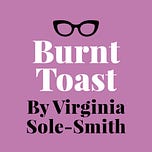


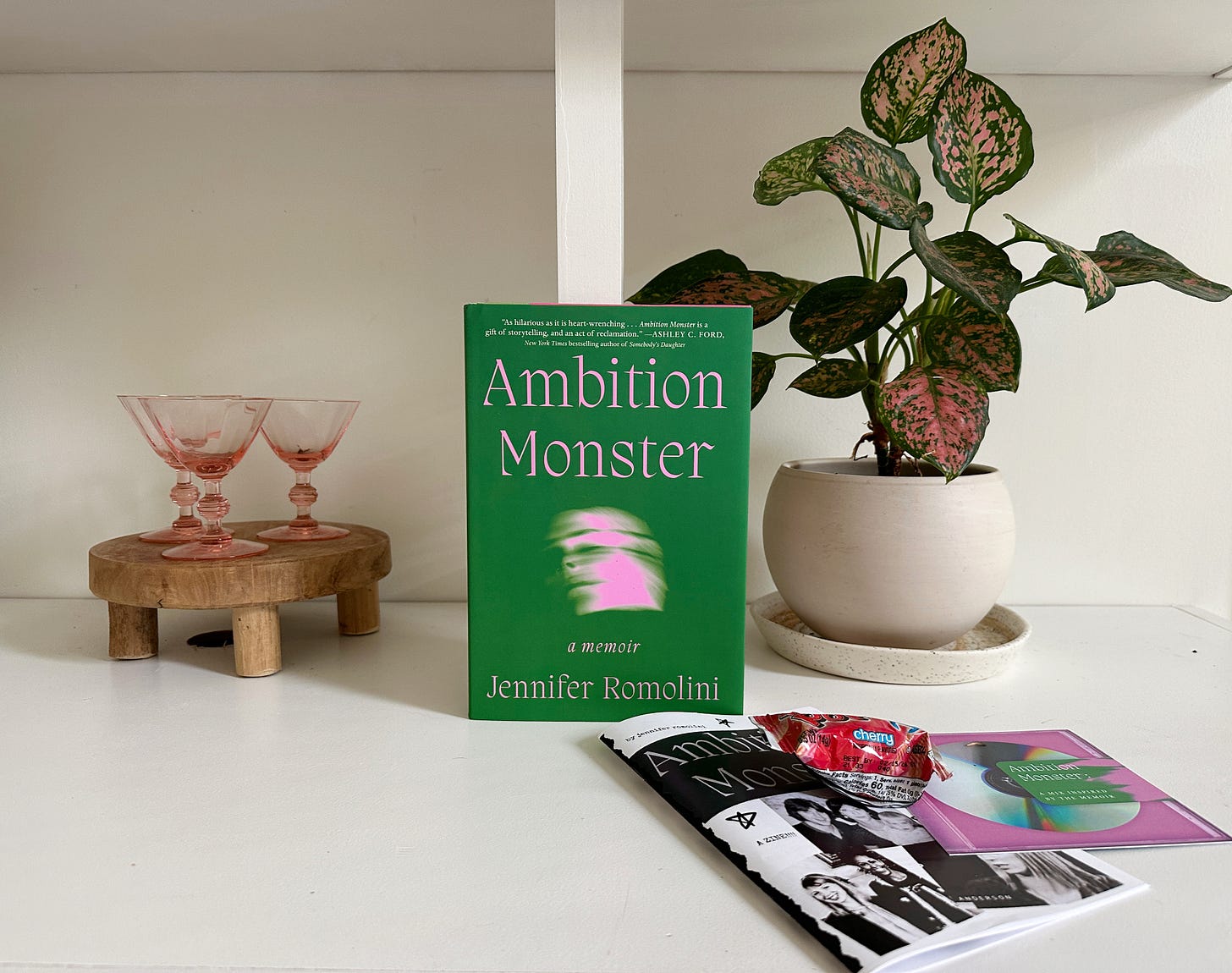
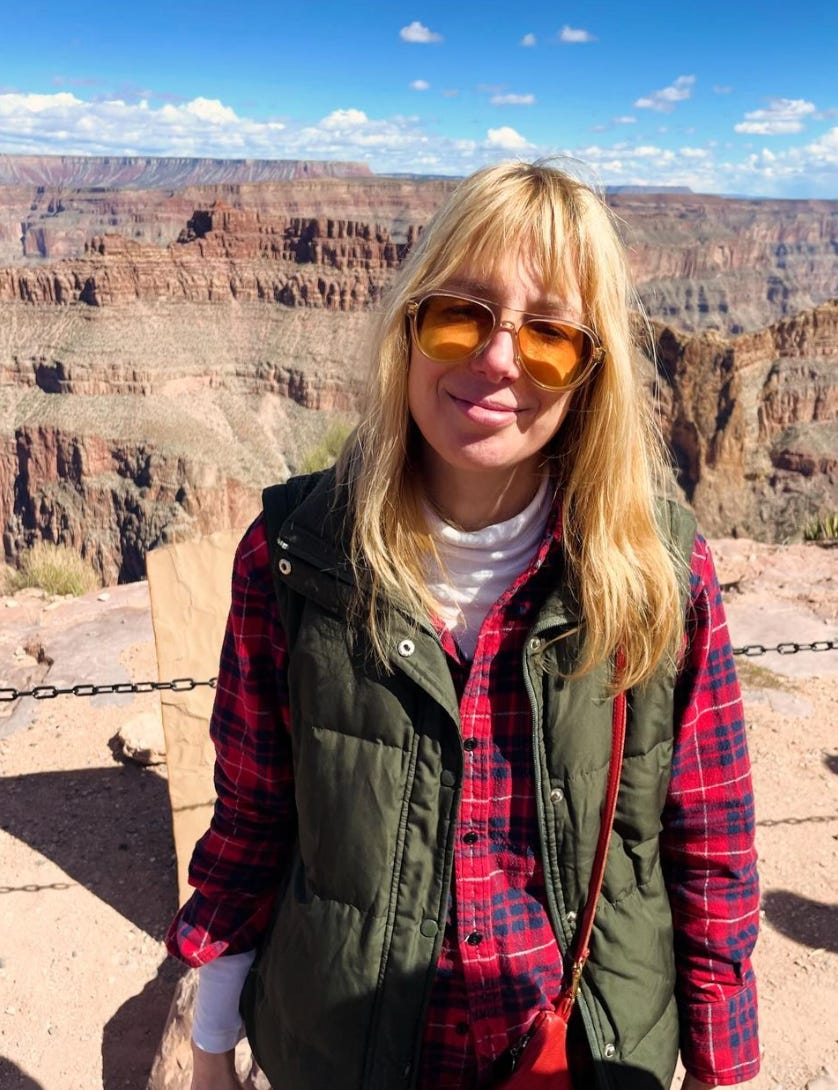
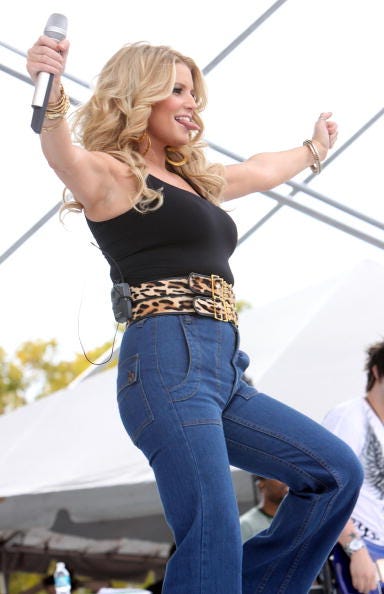
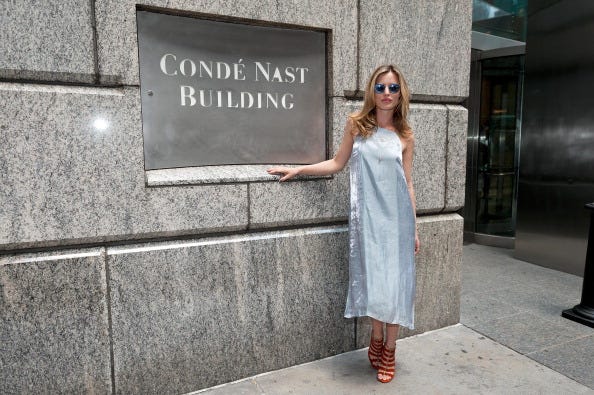
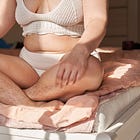


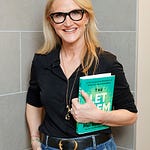


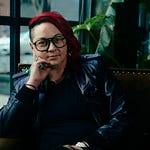




Share this post